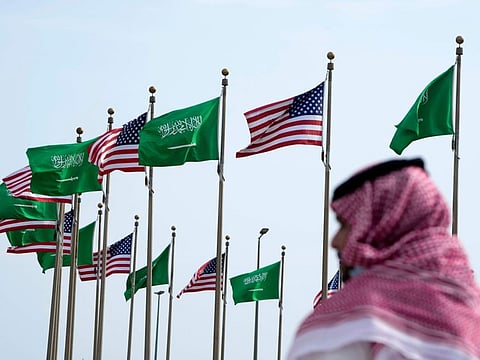Friday’s Jeddah summit showcases GCC unity
Regional security, energy in focus as Arab leaders meet Biden in milestone trip

Cairo: More than a year after they resolved a prolonged row, leaders of the Gulf Cooperation Council (GCC) will on Friday-Saturday meet for a summit projecting unity of the six-nation grouping.
They will come together at a high-profile regional meeting in which US President Joe Biden will participate during his landmark visit to Saudi Arabia as part of a regional trip, his first since he took office early last year.
The talks in the Saudi port city of Jeddah will showcase the importance of the Gulf region for the world economies that are roiled by soaring energy prices and increasingly bloated inflation.
On sitting down with the GCC leaders on Friday, Biden will find himself face to face with a united bloc that differs from the one that existed when his predecessor Donald Trump visited Saudi Arabia in May 2017.
Inter-GCC cohesion was restored at a summit held in January last year in the Saudi city of AlUla where reconciliation was forged between a Saudi-led bloc and Qatar after three years of strains.
In mid-2017, Saudi Arabia, the UAE, Bahrain and Egypt had severed diplomatic and transportation links with Qatar. That boycott came to an end last year, and ties have since thrived between the five Arab countries.
Established in 1981, the GCC comprises Saudi Arabia, the UAE, Kuwait, Oman, Bahrain and Qatar.
In the lead-up to Biden’s trip, the region’s leaders held a flurry of talks coordinating stances amid geopolitical shifts and global woes. Last month, Saudi Crown Prince Mohammad bin Salman visited Egypt, Jordan and Turkey.
Egyptian President Abdul Fattah Al Sissi, Jordan’s King Abdullah II and Iraqi Prime Minister Mustafa Al Kadhimi will attend the Jeddah summit too.
Eyeing ‘integrated Middle East’
Unity is the keyword for the GCC in particular and the Arab world in general as Biden eyes a “more secure and integrated Middle East”.
As he sets foot for his maiden presidential trip to the region, Biden appears fully convinced of the paramount importance of the Middle East for US interests and the global economy at this challenging time.
“Its waterways are essential to global trade and the supply chains we rely on,” he said in an opinion piece published in The Washington Post earlier this week.
Its energy resources, he added, are vital for mitigating the impact on global supplies of the Ukraine war.
“In Jeddah, leaders from across the region will gather, pointing to the possibility of a more stable and integrated Middle East, with the United States playing a vital leadership role,” Biden said.
The US president remarked that he will also be the first president to fly from Israel to Saudi Arabia which he said would be a ”small symbol of budding relations and steps toward normalisation” between Israel and the Arab world.
Dramatic shift in Biden policy
The trip to Saudi Arabia marks an about-turn for Biden. In his latest commentary, he looked at pains to advocate his change of heart, terming Saudi Arabia as a strategic partner for 80 years.
“Today, Saudi Arabia has helped to restore unity among the six countries of Gulf Cooperation Council, has fully supported the truce in Yemen and is now working with my experts to help stabilise oil markets with other OPEC producers,” Biden wrote.
In his attempt to secure lower energy prices at home, Biden wants to secure shipping routes in the Middle East, vital as they are for world oil shipments.
Iran nuclear programme
To this end, stopping Iran’s perceived regional meddling and defang its proxies is essential. Biden will have also to allay fears in the region about Iran’s contested nuclear programme. The Gulf countries understandably insist on having a say in any new nuclear deal reached with Tehran.
“My administration will continue to increase diplomatic and economic pressure until Iran is ready to return to compliance with the 2015 nuclear deal, as I remain prepared to do,” Biden said.
Ending Yemen’s long-running war involving Iran-aligned rebels is another item on Biden’s agenda.
What makes Biden tack?
Biden’s tone has significantly changed due to changing global crises and realisation of the region’s paramount importance for US interests, observers say.
“Resetting American ties with Saudi Arabia and the region’s countries, and encouraging a moderate axis to take shape lie at the heart of Biden’s visit,” said Saudi writer Fahd Sulaiman.
The trip, argued the writer, is designed to take the US-Saudi ties forward after years of pressure and dominance of anti-Saudi ideologies in American policy and media.
“The visit,” Sulaiman wrote in Asharq Al Awsat newspaper, “will reset the compass towards what Biden has called strategic partnership with the region’s trade and development hub, i.e. the Gulf countries.”







